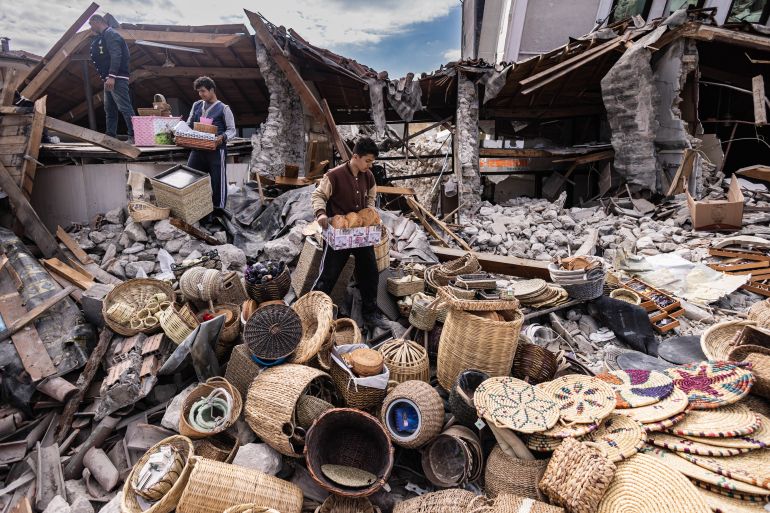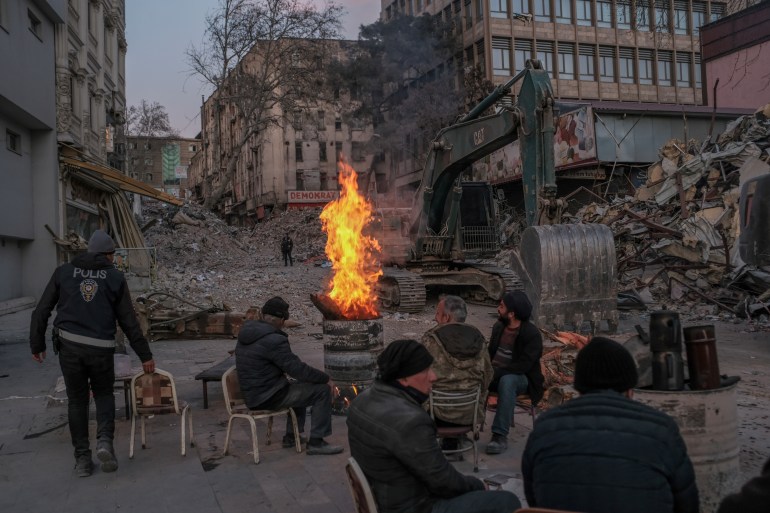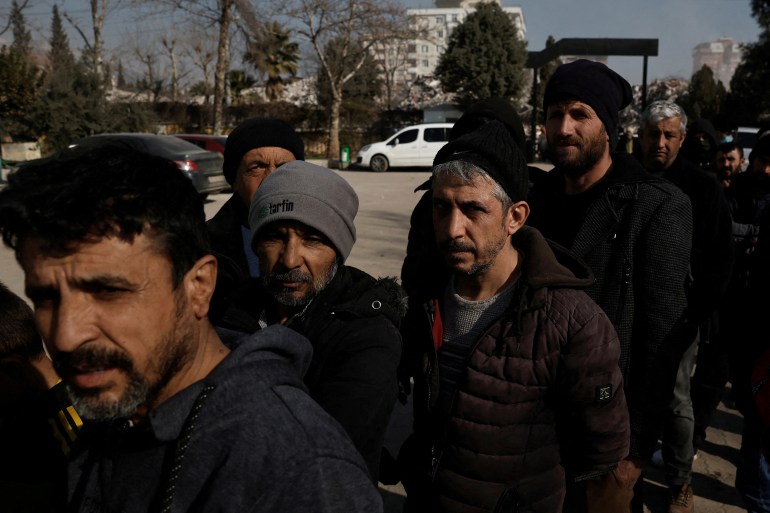Turkey earthquake rescue operations to end, government says
The head of the Disaster and Emergency Management Authority says rescue operations will likely end on Sunday evening.

The Turkish Disaster and Emergency Management Presidency (AFAD) says search and rescue operations have ended in most provinces nearly two weeks after this month’s devastating earthquakes in Turkey and Syria.
“The death toll due to the earthquakes rose to 40,642, and the work of searching and rescue for people stuck under the debris has ended in most of the provinces,” Yunis Sezar, head of AFAD, said in a presser on Saturday.
Keep reading
list of 3 itemsDoctors rush to Turkey’s quake-hit areas to bolster health system
Ghanaian footballer Atsu’s body found under Turkey quake rubble
“We believe we will end the search and rescue operations by tomorrow night,” he added.
A magnitude 7.8 earthquake struck Turkey’s southeast and neighbouring Syria on February 6, killing more than 45,000 people and leaving more than a million people homeless along with an economic cost expected to run into billions of dollars.

“We are in front of perhaps the biggest disaster we have faced in history. The damage from the earthquakes and the aftershocks – that were more than 5,700 – were not only restricted to the affected 11 provinces,” Sezar said.
In Syria, more than 5,800 deaths have been reported, mostly in the northwest. The figure has not changed for several days.
The World Health Organization estimates that some 26 million people across both Turkey and Syria need humanitarian aid.
Another ‘miracle’ rescue
Twelve days after the earthquakes, rescue workers from Kyrgyzstan saved several members of a Syrian family of five on Saturday from the rubble of a building in Antakya in southern Turkey.
Three people, including a child, were rescued. The mother and father survived, but the child died later of dehydration, the rescue team said. An older sister and a twin did not make it.
“We heard shouts when we were digging today an hour ago. When we find people who are alive we are always happy,” Atay Osmanov, a member of the rescue team, told Reuters news agency.
Ten ambulances waited on a nearby street that was blocked to traffic to allow the rescue work.
Workers asked for complete silence and for everyone to crouch or sit as the teams climbed on top of the building’s rubble where the family was found to listen for any more sounds using an electronic detector.
Teams have been finding survivors all week despite them being stuck for so long under the rubble in freezing weather, but their numbers have dropped to just a handful in the past few days.
Al Jazeera’s Sinem Koseoglu reporting from Ankara said many survivors were hoping the search and rescue operations would continue for longer.
“Some people didn’t hear anything from their relatives. They don’t know whether they’re dead or alive, or in the hospital. They have no information,” she added.
Aid bottlenecks and health fears
The damage is immense on both sides of the border and health officials are concerned about the possible spread of infection as a result of damage to sanitation infrastructure and lack of clean water in many stricken communities.
Late last year, a cholera outbreak declared in Syria began sweeping the northwest, and aid groups as well as health experts have warned that the damage caused by the earthquakes will exacerbate the situation.
There are health fears on the Turkish side as well, with doctors on the ground pointing to the lack of sanitation, safe water, and the overcrowding of shelters are hazards that could result in the spread of disease.

Northwestern Syria had a wait of three long days after the earthquake struck before aid convoys were able to navigate damaged Turkish roads and pass through the Bab al-Hawa crossing, which was the only UN-approved land crossing into this opposition-controlled region where a number of armed groups at war with forces loyal to President Bashar al-Assad are active.
Since then, the UN has apologised for the delay and begun using two other land crossings from Turkey into northern Syria.
However, there seem to be other impediments, with the World Food Programme (WFP) saying authorities in the northwest were blocking access to the area.
“That is bottlenecking our operations. That has to get fixed straight away,” WFP Director David Beasley told Reuters on the sidelines of the Munich Security Conference.
US Secretary of State Anthony Blinken is expected to travel to Turkey and meet President Recep Tayyip Erdogan, sources familiar with the plan told Reuters.
Since the earthquake, the US has sent a search and rescue team to Turkey, medical supplies, concrete-breaking machinery, and additional funding of $85m in humanitarian aid that also covers Syria.